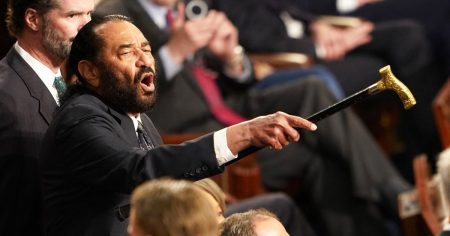Oklahoma Governor Blocks Plan to Collect Immigration Status of Schoolchildren
Breaking: Governor Stitt Rejects Controversial School Enrollment Rule
In a significant move, Oklahoma Governor Kevin Stitt has announced his decision to halt a contentious plan that would have required schools to collect the immigration status of children during enrollment. The proposal, championed by State Superintendent Ryan Walters, had sparked widespread outrage among educators, civil rights advocates, and immigrant families. Stitt, a Republican, emphasized that while he opposes illegal immigration, targeting young children is not an effective or appropriate approach to addressing the issue.
The Proposal and Its Backlash
The rule, approved by the State Board of Education last month, would have mandated parents or guardians to provide proof of their child’s citizenship or legal status when enrolling them in public school. Acceptable documents included a U.S. birth certificate, passport, permanent resident card, or other legal identification. Critics argued that this policy would create fear and discourage immigrant families from enrolling their children in school, potentially violating their right to education.
Civil liberties groups and educators quickly mobilized against the proposal, expressing concerns about its potential consequences. “The governor’s sound rejection of this radical attempt to undermine the right to education is a result of the concerted advocacy of parents, educators, and advocates across Oklahoma,” said Kica Matos, president of the National Immigration Law Center. The backlash highlights the deep-seated concerns within Oklahoma’s immigrant communities about policies that could lead to discrimination and exclusion.
Governor Stitt’s Stance: Prioritizing Public Safety Over Politics
Governor Stitt, who is in his second term and term-limited in 2026, made it clear that his decision was driven by a focus on public safety rather than political grandstanding. “Collecting 6, 7, 8-year-old kids’ addresses and immigration status in the state of Oklahoma, that’s not a public safety issue,” he said. Instead, Stitt argued that policymakers should target individuals who commit crimes and are in the country illegally, rather than intimidating schoolchildren and their families.
By rejecting the proposal, Stitt also sent a clear message about the use of children as political pawns. He expressed frustration with the State Board of Education members who approved the rule, stating that their actions were inappropriate and misguided. This disagreement led to the governor replacing three board members, further signaling his disapproval of the policy and its underlying motivations.
Political Fallout: A Clash Between Elected Officials
The controversy has also exposed growing tensions between Governor Stitt and State Superintendent Ryan Walters, a former secretary of education under Stitt. Walters, known for his vocal opposition to what he calls “woke” ideology in schools, has been a polarizing figure in Oklahoma politics. He has previously pushed for measures such as requiring Bible instruction in classrooms and banning certain books from school libraries.
In response to his removal from the State Board of Education, Walters announced plans to place two of the ousted members on a Trump advisory committee. He framed the move as part of a broader fight against what he described as the “liberal D.C. swamp” influencing Oklahoma’s government. However, Governor Stitt was quick to dismiss Walters’ actions as political posturing. “These guys are running for their next office,” Stitt said. “They’re playing politics, trying to get their names in the paper, and Oklahomans can see right through it.”
A Broader Debate: Immigration, Education, and the Future of Oklahoma
The dispute over the enrollment rule reflects a larger national conversation about immigration, education, and the role of government in addressing these issues. While some policymakers argue that stricter enforcement measures are necessary to uphold the rule of law, others, like Governor Stitt, are urging a more nuanced approach that balances enforcement with compassion and practicality.
For immigrant families in Oklahoma, the governor’s decision offers a sense of relief but also underscores the ongoing challenges they face. Many continue to navigate a complex and often hostile legal landscape, where policies like the one rejected by Stitt could have far-reaching consequences for their children’s education and well-being. As the state moves forward, advocates are calling for greater protections for immigrant students and families, ensuring that all children have equal access to education regardless of their immigration status.
In conclusion, Governor Stitt’s decision to block the proposed rule is a significant step toward prioritizing the welfare of Oklahoma’s children and upholding the principles of equality and fairness in education. However, the debate over immigration and education is far from over, and the state will likely continue to grapple with these issues in the years to come.









